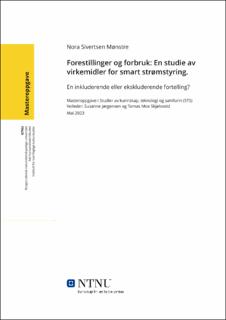| dc.contributor.advisor | Jørgensen, Susanne | |
| dc.contributor.advisor | Skjølsvold, Tomas Moe | |
| dc.contributor.author | Mønstre, Nora Sivertsen | |
| dc.date.accessioned | 2023-09-18T17:19:36Z | |
| dc.date.available | 2023-09-18T17:19:36Z | |
| dc.date.issued | 2023 | |
| dc.identifier | no.ntnu:inspera:143154618:96802456 | |
| dc.identifier.uri | https://hdl.handle.net/11250/3090193 | |
| dc.description.abstract | Den norske klimapolitikken baserer seg i stor grad på elektrifisering av samfunnet. Dette vil føre til at kapasiteten i strømnettet blir presset. For å løse problemet kan Norge bygge ut nye kraftlinjer, eller bli mer fleksibel med strømforbruket. Fleksibelt strømforbruk handler om å flytte forbruk i tid, og helst slik at man fordeler det totale forbruket utover døgnet. Statsforetaket Enova iverksatte støtteordningen til smart strømstyring for å oppfordre norske forbrukere til å utføre tiltak som vil bedre energibruken i egen bolig. Håpet er at virkemiddelet vil bidra til å etablere teknologier til smart strømstyring i markedet, og at dette vil øke fleksibilitet i strømnettet. Hensikten med forskningsprosjektet har vært å undersøke hvilke egenskaper forbrukere må ha for å kunne benytte seg av teknologier for smart strømstyring, og støtteordningen til Enova. Studien baserer seg på en scriptanalyse og ni kvalitative intervjuer, med representanter fra både forbruker- og leverandørsiden. Script og fleksibilitetskapital utgjør det teoretiske rammeverket for prosjektet.
Støtteordningen til smart strømstyring ble lansert i februar 2022, og i løpet av året mottok 1280 forbrukere støtte til sitt system. I dette forskningsprosjektet finner jeg at forbrukere først og fremst må ha økonomiske ressurser for å benytte seg av teknologier til smart strømstyring, og for å møte vilkårene for støtte hos Enova. Videre må forbrukere som gjennomfører søknadsprosessen hos Enova også ha tekniske ressurser for å kunne gjøre rede for og dokumentere sitt smarte strømstyringssystem. Den siste egenskapen som kreves er fleksibilitetskapital som handler om muligheten forbrukerne har til å være fleksibel med strømforbruket sitt. Forestillingene om forbrukernes egenskaper resulterer i at støtteordningen treffer smalt i befolkningen, og at forbrukerne som mottar støtte både kan, og ønsker, å kjøpe teknologiene uavhengig av ordningen. Offentlige virkemidler som skal bidra med å sikre overgangen til et lavutslippssamfunn bør satse på å treffe bredt og sikre sosial inkludering. | |
| dc.description.abstract | Norwegian climate policy is largely based on the electrification of society. This will lead to the capacity of the electricity grid being strained. To solve this problem, Norway can either build new power lines or become more flexible with electricity consumption. Flexible electricity consumption refers to shifting usage over time, preferably in a way that distributes the total consumption throughout the day. The state enterprise Enova implemented the support scheme for smart energy management systems to encourage Norwegian consumers to take actions that will improve energy use in their own homes. The hope is that this measure will contribute to the establishment of technologies for smart energy management systems in the market, and that this will lead to increased flexibility in the power grid. The aim of this research project has been to investigate which qualities consumers must have to be able to utilize smart energy management systems and the support scheme from Enova. The study is based on a script analysis and nine qualitative interviews with representatives from both the consumer and supplier side. Script and flexibility capital constitute the theoretical framework of the project.
The support scheme for smart energy management systems was launched in February 2022, and during that year, 1280 consumers received support schemes for their system. In this research project, I find that consumers must first and foremost have financial resources to be able to use smart energy management systems and to meet the conditions for the support scheme from Enova. Furthermore, consumers who go through the application process at Enova must also have technical resources to be able to explain and document their smart energy management system. The last characteristic required is flexibility capital, which refers to the opportunity consumers have to be flexible with their electricity consumption. The notions about consumer characteristics result in the support scheme reaching narrowly within the population, and the consumers who receive support schemes can, and want to, purchase the technologies regardless of the scheme. Public measures aimed at helping secure the transition to a low-emission society should strive to reach widely and ensure social inclusion. | |
| dc.language | nob | |
| dc.publisher | NTNU | |
| dc.title | Forestillinger og forbruk: En studie av virkemidler for smart strømstyring. - En inkluderende eller ekskluderende fortelling? | |
| dc.type | Master thesis | |
